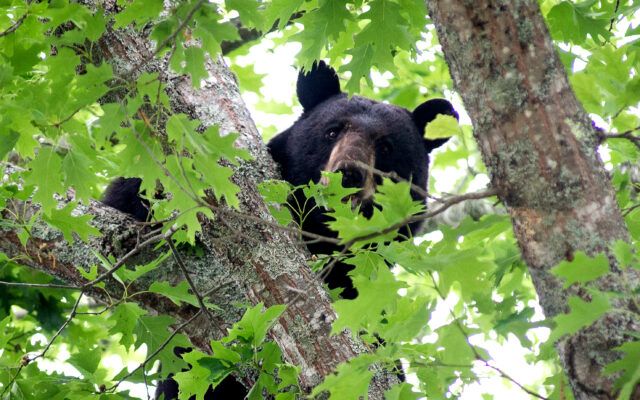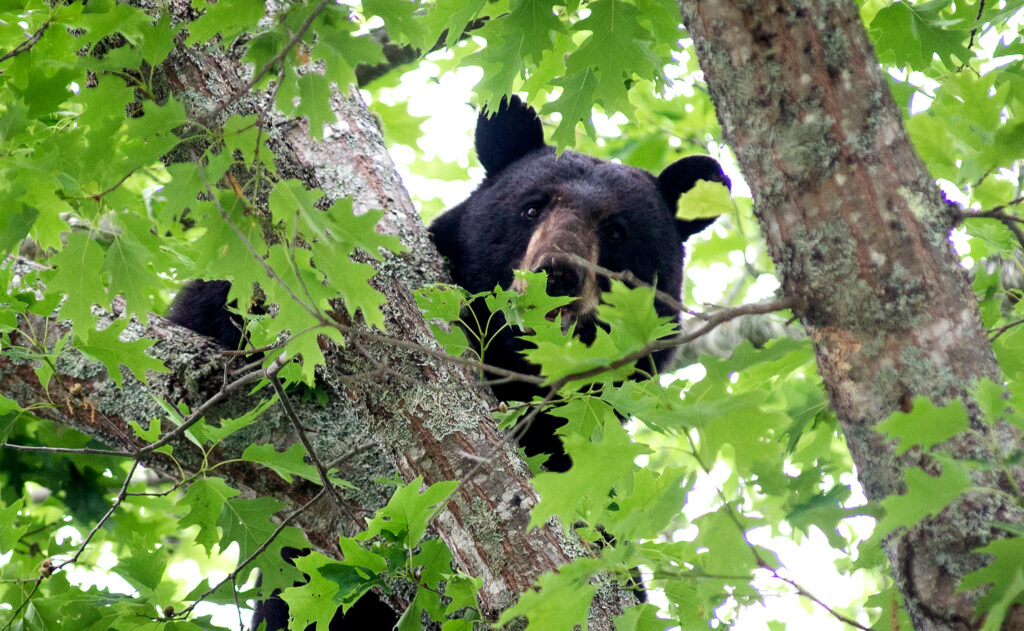
Bears are up a little early. Here’s how to avoid conflicts.
By Julie Harris, Bangor Daily News Staff
It’s a little bit early, but one of Maine’s most iconic animals is awake and on the hunt for food.
Black bears, except for those in the colder, snow-covered northern areas, are coming out of hibernation sooner than usual, thanks to the warm, mild winter in most of the state, according to Maine’s bear biologist.
Their early arrival on the scene is catching people off guard, and bears are taking advantage of bird feeders and unsecured trash cans. The Maine Department of Inland Fisheries and Wildlife has already had a handful of complaints about bear raids, said Caitlin Drasher, the state’s bear biologist.

HUNGRY BEARS — Black bears are waking up early in Maine this year due to the mild winter. It’s time to take bird feeders in and secure your trash.
“It’s too early for severe or chronic issues (between bears and people). We try not to move bears because they usually just come back,†Drasher said.
It’s better to try to scare them off and to remove what is attracting them to a person’s yard, she said.
Lone males and females, including those with yearling cubs, started coming out of hibernation in mid-March, an entire month sooner than usual. Sows with new cubs are just starting to come out, but might stay in their dens a little longer if the weather deteriorates again, Drasher said.
Bears have been known to leave their dens in winter to take a stroll on a warm, sunny day, but they go back to hibernating when there’s no evident food. Once the bears start eating, they stay awake, she said.
Bears will eat early vegetation such as skunk cabbage and sedges when they first come out of hibernation, but it’s generally a difficult time of year for food. Spring temperature drops can kill early vegetation, which adds to their problems.
“The bears were in great shape in the fall when they went into hibernation and their weights are higher this spring than what they would be in a lean year,†Drasher said.
Last fall was a banner year for acorns so there are still some of those around this spring, plus lots of early vegetation.
But it’s much easier to stroll into a yard and snag a full bird feeder or raid unsecured trash cans, which means bears and humans get uncomfortably close to each other.
Here are some tips from Drasher and the MDIF&W:
— Bring in bird feeders and suet holders from the yard and secure the bird seed in a sturdy storage place. The nutritious nuts and seeds are just too much of a temptation to a hungry bear.
— Secure your trash in a building or bear-proof dumpster. You can retrofit a dumpster with 2-by-4 stringers across the top opening that the plastic covers of the unit will fit over, secured with ratchet straps. It prevents bears from breaking the plastic flip covers to get into the dumpster, Drasher said.
— Bears can smell a good barbecue a long way off. If you cannot store your grill in a garage with good doors, make sure to burn off the food and change the grease pans whenever you use it, especially if your unit stays outside.
— If you take your dog with you for a walk or hike in the woods, leash it. Most of the few instances of bear attacks in Maine have involved unleashed dogs, Drasher said.
— Don’t get complacent in July and start leaving your bird feeders out all night. Bears wander in and out of areas and can quickly learn when to come back to a place for an easy meal.
— Lock your car doors if your vehicle is sitting in the driveway. Bears have a keen sense of smell and will break into vehicles for even a scented lip balm. In other states, bears have opened vehicle doors from the outside, gone in to find whatever they were smelling and then gotten stuck inside when the door closed behind them, Drasher said. “They can do a lot of damage trying to get out,†she said.
— If you are a weekend tourist, don’t leave your trash outside of your camp or put your bins out Sunday for pickup later in the week. Take your trash with you and dispose of it at home.
— Put up electric fencing to protect chickens and beehives from food-seeking bears.
— To protect yourself while in the woods, hike in groups, make noise in thick cover, and carry bear spray and a walking stick for defense.The Maine Department of Inland Fisheries and Wildlife has a webpage devoted to living with Maine black bears at maine.gov/ifw/fish-wildlife/wildlife/living-with-wildlife/avoid-resolve-conflict/bears.html It includes what to do if a bear is aggressive toward you and how to avoid conflicts in the first place.
Maine really doesn’t have a lot of bear-human conflicts, said Dresher, who came to the state in January from Connecticut where there were dozens more. She highlighted Maine’s vast forested areas and its hunting and trapping seasons as the primary reasons.
Connecticut outlawed bear hunting several decades ago, but there are certain circumstances in which it is legal to kill one, including to defend human life or to protect farm animals, according to the Connecticut Department of Energy and Environmental Protection.